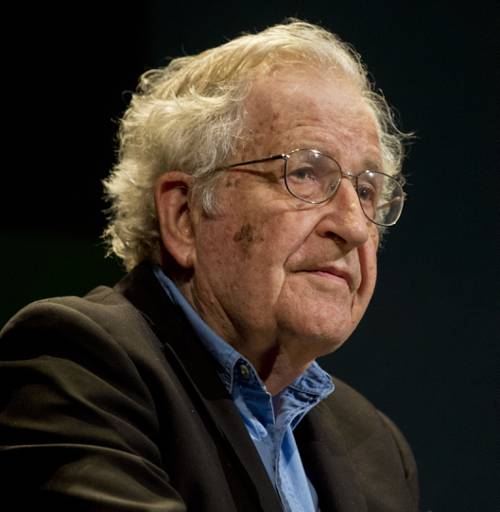
FAQ About Noam Chomsky

Who is Noam Chomsky?
Noam Chomsky is an American linguist, philosopher, cognitive scientist, historian, and social critic. Born on December 7, 1928, he is considered a foundational figure in modern linguistics for his development of the theory of transformative-generative grammar. Chomsky has also been a prominent critic of political systems, especially regarding media and foreign policy.

What is Noam Chomsky's theory of transformational-generative grammar?
Transformational-generative grammar is a theory of syntax that Noam Chomsky introduced in the late 1950s. It posits that the ability to generate a sentence can be described by a series of transformational rules, allowing finite rules to explain the structure of an infinite number of possible sentences. This theory revolutionized the study of linguistics, suggesting that the fundamental structure of language is innate to humans.

Why is Noam Chomsky significant in the field of linguistics?
Noam Chomsky is significant in linguistics due to his groundbreaking work on the theory of generative grammar, which altered the field’s approach to language analysis. He proposed that understanding the syntactic structures common across languages could reveal innate aspects of human cognition, thus shaping future research in linguistics, cognitive science, and psychology.

What are some of Noam Chomsky's contributions to political thought?
Chomsky is well-known for his critiques of media and political systems. His works like "Manufacturing Consent," co-authored with Edward S. Herman, highlight how mass media serves and propagates the interests of powerful corporate and political elites. Chomsky often discusses themes such as imperialism, human rights, and economic power structures, emphasizing the impact of US foreign policy.

What is Noam Chomsky's view on media and propaganda?
Noam Chomsky argues that the media acts as a propaganda system that primarily serves elite interests by controlling the flow and framing of information to the public. In "Manufacturing Consent," he describes the "propaganda model" of communication, where economic, social, and political agendas shape news content to influence and manage public opinion.

What is Noam Chomsky's perspective on language acquisition?
Noam Chomsky proposed that humans are born with an innate ability to acquire language, a hypothesis known as the "Universal Grammar." He argues that children are equipped with a genetic blueprint for language learning, explaining why young children can rapidly learn complex languages regardless of their background.

How has Noam Chomsky influenced cognitive science?
Chomsky has significantly influenced cognitive science by challenging behaviorist views on language learning, advocating instead for understanding the cognitive processes underlying language. His insights suggest that the human brain contains mental structures dedicated to linguistic processing, which has inspired extensive research into neural and psychological bases of language.

What are the main themes in Noam Chomsky’s political activism?
Chomsky's political activism focuses on critiquing U.S. foreign policy, advocating for social justice, and exposing the influence of corporate power on democracy. He examines how media, economic disparities, and governmental power exert control over populations, stressing the need for awareness and active participation in democracies to overcome these challenges.

Has Noam Chomsky written any books?
Yes, Noam Chomsky is a prolific author and has written extensively on both linguistics and political activism. Some notable works include "Syntactic Structures," "Aspects of the Theory of Syntax," "Manufacturing Consent," and "Hegemony or Survival." His books cover topics ranging from academic theories of language structure to detailed analyses of media and global politics.

How does Noam Chomsky describe the role of universities in society?
Chomsky often criticizes universities for being largely aligned with corporate and governmental interests, potentially stifling independent thought and critical inquiry. He suggests academia should foster critical thinking, challenge power structures, and contribute to societal advancement by encouraging intellectual exploration and social responsibility among students and scholars.

What is Noam Chomsky's "propaganda model"?
The "propaganda model," developed by Noam Chomsky and Edward S. Herman, describes how media organizations often serve the interests of entrenched power structures by filtering news content through five "filters": ownership, advertising, sourcing, flak, and ideology. This model explains how media can manipulate public perception to align with corporate and political interests.

How has Noam Chomsky impacted education?
Noam Chomsky has influenced education through his theories on language acquisition, which have reshaped linguistic studies and language teaching methods. Additionally, his advocacy for critical thinking and skepticism of power and media has encouraged educational programs to emphasize critical inquiry and civic responsibility as part of holistic learning.

What criticisms has Noam Chomsky faced?
Chomsky has faced criticism from various fronts, particularly for his political views and interpretations of international events. Critics argue that he sometimes oversimplifies complex geopolitical situations or overlooks certain ethical considerations. Additionally, some academics have debated the empirical foundations of his theories, particularly in linguistics.

Was Noam Chomsky involved in any controversies?
Noam Chomsky has been involved in controversies largely due to his outspoken views on politics and media. His critiques of U.S. foreign policy and analysis of the mass media often provoke strong reactions. Additionally, his support of free speech has occasionally led to contentious defenses of controversial figures and ideas in the context of ensuring open discourse.

What is Noam Chomsky's academic affiliation?
Noam Chomsky was a long-time professor at the Massachusetts Institute of Technology (MIT), where he spent much of his career. In recent years, he has joined the University of Arizona as a Laureate Professor, continuing his research and teaching in linguistics and related areas.

What is the Chomsky Hierarchy?
The Chomsky Hierarchy is a classification of formal languages based on their generative power, introduced by Noam Chomsky. It divides languages into four types: regular, context-free, context-sensitive, and recursively enumerable languages. This hierarchy is foundational in theoretical computer science and linguistics, providing a framework for understanding the complexities of different language types.

What is Noam Chomsky's position on education reform?
Chomsky criticizes the standardization and commercialization of education systems, arguing that they discourage critical thinking and creativity. He advocates for an educational model that emphasizes understanding, exploration, and empowerment, encouraging students to question orthodoxies and develop skills necessary for participating in democratic societies.

How did Noam Chomsky revolutionize linguistics with his work?
Noam Chomsky revolutionized linguistics by introducing the concept of innate linguistic structures and the theory of transformational-generative grammar. His ideas challenged prevailing behaviorist models of language learning, shifting the focus to cognitive processes and innate language faculties, which laid the groundwork for modern linguistic theory and cognitive science.

How does Noam Chomsky view capitalism and its impact on society?
Chomsky is critical of capitalism, particularly in its neoliberal form, arguing it leads to inequality, exploitation, and environmental degradation. He contends that capitalist systems prioritize profit over human and ecological well-being, advocating instead for more equitable systems that prioritize community welfare, sustainability, and democratic participation.

How has Noam Chomsky's work influenced modern linguistics?
Chomsky's work has fundamentally transformed modern linguistics by establishing new paradigms for understanding language acquisition and syntax. His theories, particularly those related to Universal Grammar, have inspired generations of linguistic research, enabling deeper insights into language development, cognitive processes, and linguistic diversity across cultures.
